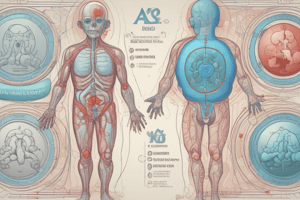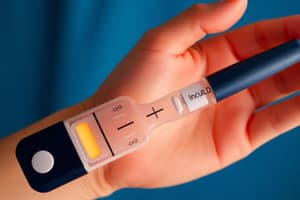Podcast
Questions and Answers
What is the average number of agents that many patients require for treatment?
What is the average number of agents that many patients require for treatment?
- Five
- Two
- Three (correct)
- Four
What should be done at each visit for patients with type 1 diabetes mellitus regarding hypoglycemia?
What should be done at each visit for patients with type 1 diabetes mellitus regarding hypoglycemia?
- Perform a thorough foot examination.
- Instruct patients to avoid all carbohydrates.
- Schedule a lipid panel assessment.
- Ask about frequency and severity of hypoglycemia. (correct)
When should a patient with type 2 diabetes mellitus receive their first dilated eye exam?
When should a patient with type 2 diabetes mellitus receive their first dilated eye exam?
- At diagnosis (correct)
- At least yearly
- Annually after the first five years
- Within three years of diagnosis
Which screening should be performed annually to assess nephropathy in patients with diabetes?
Which screening should be performed annually to assess nephropathy in patients with diabetes?
What is the recommended follow-up for assessing A1C in patients who meet treatment goals?
What is the recommended follow-up for assessing A1C in patients who meet treatment goals?
What is the primary factor that usually precipitates diabetic ketoacidosis (DKA) in patients with type 1 diabetes?
What is the primary factor that usually precipitates diabetic ketoacidosis (DKA) in patients with type 1 diabetes?
Which of the following describes the hallmark laboratory values associated with diabetic ketoacidosis?
Which of the following describes the hallmark laboratory values associated with diabetic ketoacidosis?
What treatment regimen is recommended for restoring the metabolic status in patients with diabetic ketoacidosis?
What treatment regimen is recommended for restoring the metabolic status in patients with diabetic ketoacidosis?
Which class of medication has shown efficacy in preventing the progression of renal disease in diabetic patients?
Which class of medication has shown efficacy in preventing the progression of renal disease in diabetic patients?
What is the recommended goal blood pressure for diabetes management according to the American Diabetes Association (ADA)?
What is the recommended goal blood pressure for diabetes management according to the American Diabetes Association (ADA)?
Flashcards are hidden until you start studying
Study Notes
Diabetic Ketoacidosis (DKA)
- DKA is a medical emergency, particularly common in type 1 diabetes.
- DKA is often triggered by missed insulin doses, illness, or infection.
- DKA patients may present with varying levels of consciousness, from alert to stuporous or comatose.
- Key diagnostic markers include high blood sugar (hyperglycemia), acidic blood (anion gap acidosis), and high ketone levels in blood or urine.
- DKA symptoms often develop quickly over 24 hours and include:
- Nausea, vomiting, abdominal pain
- Rapid breathing (hyperventilation)
- Excessive urination (polyuria)
- Excessive thirst (polydipsia)
- Weight loss
- Lethargy, seizures, coma (in severe cases)
- DKA treatment focuses on:
- Restoring fluid volume with intravenous saline solution
- Replacing electrolytes, especially potassium
- Administering insulin through a continuous IV infusion to correct metabolic imbalances
Diabetes Complications and Management
-
Nephropathy (Kidney Disease):
- Good blood sugar and blood pressure control are crucial for preventing or slowing kidney damage.
- Medications like ACE inhibitors and ARBs can help protect the kidneys.
-
Coronary Heart Disease (CHD):
- Multiple risk factor management including:
- Controlling cholesterol and blood pressure
- Smoking cessation
- Antiplatelet therapy (aspirin or clopidogrel)
- Reduce the risk of heart attacks and strokes.
- Multiple risk factor management including:
-
Dyslipidemia (High Cholesterol):
- Statins are recommended for all patients with CHD or those over 40 with diabetes and other risk factors, regardless of cholesterol levels.
-
Hypertension (High Blood Pressure):
- Target blood pressure for diabetic patients: less than 130/80 mm Hg
- ACE inhibitors and ARBs are recommended as first-line treatment.
- Other medications like diuretics and calcium channel blockers might be needed.
Evaluating Therapeutic Outcomes
-
Long-Term Glycemic Control:
- Measure HbA1c (glycosylated hemoglobin) at least twice a year to assess average blood sugar levels over the past 3 months.
- In patients with stable blood sugar control and no changes in treatment.
-
Hypoglycemia Monitoring:
- For type 1 diabetes patients, inquire about frequency and severity of low blood sugar episodes at each visit.
- Document any episodes requiring assistance or medical attention.
- Take steps to prevent future episodes.
Screening for Complications
-
Eye Exams:
- Annual dilated eye exams recommended for type 2 diabetes.
- Initial exam within the first 5 years of diagnosis for type 1 diabetes followed by annual exams.
-
Blood Pressure (BP):
- Check BP at every visit.
-
Foot Exams:
- Examine feet at each visit for:
- Distal pulses
- Skin integrity
- Calluses
- Deformities
- Examine feet at each visit for:
-
Foot Sensation:
- Annual screening for foot sensory loss using a 10-g monofilament.
-
Nephropathy Screening:
- Urine microalbumin testing recommended at diagnosis for type 2 diabetes and 5 years after diagnosis for type 1 diabetes.
- Assess urinary albumin, creatinine ratio, and estimated glomerular filtration rate (eGFR) at least once a year for both type 1 and type 2 diabetes.
-
Lipid Panel:
- Annual fasting lipid panel for patients on lipid-lowering therapy.
Studying That Suits You
Use AI to generate personalized quizzes and flashcards to suit your learning preferences.





